Helping improve quality of life for your parent
Quality of life is all about being able to continue doing the things we love and even trying out new experiences.
Changes in health and mobility can make an enjoyable lifestyle more difficult though.
So what can families offer to do that will help their seniors make the most of their lives?
- Staying in: home adaptations and keeping the home safe
- Going out: staying active, socialising and getting away
- Staying in touch: combating loneliness and isolation
- Finding new home-based activities
- Spending quality time together
- Making home a safe space
Staying in: home adaptations and keeping the home safe
It’s good to take a fresh pair of eyes to the home. Rearranging the furniture to remove trip hazards is a useful place to start.
Could grab rails be useful for bathrooms and outside steps? Simple changes like these can be introduced gently over time just to make life a little easier.
If your parents still enjoy gardening, you could look at installing raised beds and ensure that paths are wide and even. There are some excellent long-handled tools on the market that make digging and weeding a lot easier without bending. Reclining armchairs and walking aids can also help.
If you’re concerned about your parents safety at home when you’re not with them, you may find our Falls Risk Assessment article useful.
Calculate your loved one's risk score
Complete our 2 minute questionnaire to receive personalised care recommendations based on an assessment of your loved one's circumstances.
Get your risk score
Going out: staying active, socialising and getting away
Getting out and about is an important aspect to quality of life in later years. Keeping physically active is vital to mobility. Your parent could join exercise, Zumba, tai chi or other classes for seniors, locally or online. Walking football is growing in popularity, and not just with older men. Or if that’s not their style, just going for regular walks is good for physical and mental health.
At the same time, driving can become more difficult if older people struggle with reaction times and vision. They may decide that they just want to drive locally, to maintain independence while reducing risks. Perhaps you could also look at downsizing the car. Or if your seniors lose confidence altogether, there are plenty of other options, including local Dial-a-Ride services and helpful taxi firms.
If you’re looking at getting away from home altogether for a few days or weeks, you’ll find that holiday home agencies are very good at categorising properties for ease of access. And there are a number of travel companies which specialise in holidays for seniors.
Staying in touch
Help older adults stay connected with loved ones. If a parent does find themselves spending more time at home, then loneliness can become an issue. Loneliness is considered to be one of the greatest plagues of our time in the western world.
Training up your parent to be confident in using a simple device for WhatsApp, Facetime or one of the other messaging and video conferencing tools can make everyone feel closer.
Whether it’s a weekly family conference call or just dropping notes to each other over the course of the day, the knowledge that this connection is there whenever you want it can really help to break down those feelings of isolation.

Finding new home-based activities
With age bringing lower levels of mobility, older people can find themselves missing out on activities they’ve always enjoyed. They may have appreciated going to the theatre and cinema, or joining groups like book clubs to keep their minds active and interact with other people.
The good news is that the pandemic prompted many organisations, such as arts groups, reading clubs, and education providers to take to the internet. And a good many of these are planning to stay online. That means there’s a whole new world of entertainment, education and conversation available to anyone through their PCs, tablets, smartphones and TVs. Seniors have more choice and wider interests than crossword puzzles!
Spending quality time together
Now that we can visit each other’s homes again, it’s very tempting to use the time for chores.
The house isn’t as clean as it used to be, the weeds are spreading across the garden, there’s nothing in the cupboards – it’s easy to think of practical things first.
But ask a parent what they would like from your precious time together, and they may well say a sit-down over a cuppa and a conversation means far more to them than whether the cobwebs have been vacuumed away.
While you have to get to those medical appointments, perhaps many of the other jobs can be outsourced to supermarket delivery services, cleaners, gardeners and the like. Then you can just concentrate on listening and talking – especially about what they feel makes for a continuing great quality of life.
Making home a safe space
Many people can manage their lives perfectly well without the need for carers. We can though improve peace of mind all round by enabling our relatives to call for help easily if they do have a fall or other incident. That’s where personal alarms can be a real help.
A safe space also means keeping at bay the threats of intruders trying to take advantage of older people in their homes.
By taking steps to make homes more secure we can help to protect our relatives from theft and fraud, and help them enjoy a full and relaxed life. A good quality of life and a positive view of ageing helps us all.
Try a personal alarm with our 30-day home trial
Our 30-day money back guarantee means your elderly loved ones can see if a personal alarm is for them from the comfort of their home. Compare personal alarms for the elderly and elderly fall alarms.


